- Home
- Jack Kerouac
Maggie Cassidy Page 14
Maggie Cassidy Read online
Page 14
Fluting spring was racing through the corridors and ritual alleys of my sacred brain in holy life and making me wake and resurge to the business of being and becoming a man. I drew deep breaths, cut shortcut quicksteps over the loose crunch cinders of the back-of-Textile dumpside river-viewing gravel drive—the tremendous views of Lowell from this ball perch of night, the countless sad tragic waters down there, over shapes of dead bushes and rat-inhabited wrecks of Reos Chandlers Pee Pee Poo machines of long ago, and the bad sand, stinking of sewage—this I could smell in spring tonights coming back from Maggie, spring’d send the stale fender with its sweet rot swills caked underneath and I’d know—this would be mixed with sweet breath river’s voice Awing at me over the lake of the bend—From Lakeview clear I could literally smell the pinecones getting ready for dry gladsummers on the ground, the azaleas were ballooning again Mrs. Faterty’s garden, Rattigan’s saloon next door would only send suds and breezy foam smells in the coming months—you couldnt mistake spring from the mop handles ratata-ing on porches of ladies—“There’s my Pa now,” Maggie is saying soon, as she walks down from the corner where the South Lowell stores and bars were and passed the joint where Mr. Cassidy’s downing his boilermakers before going home to sleep. “So I said ‘We’ll reach in get six, kick one, kick two, kick em right in the lead then we’ll spot to clear and shove the rest!’—’What?’ he sez to me ‘I cant understand all that in one sitting—’ ‘Well for krissakes’ I said ‘you’re gettin paid same as I am aintcha? And I been railing around here for seventeen years aint I? So you expect me to stop here and explain that to you again. Just keep your mouth shut and your eyes open—you’ll learn—”‘ Maggie walks by hearing this speech and smiles, goes home to tell her mother—Dark laughter. Out comes a little kid on the porch, and the moon. Among the brown Fellaheen lights of life I’m hurrying, off the bus at the cemetery corner and right down through a railroad overpass and big scrabbly lamplit plaza of two roads converging roughly and across that the pitch into that black barrel of Massachusetts Street South Lowell Night which has trellises, clinging vines, curly locks.
Spring blows in my nose, in my airy brain—The call of the railroad train is howdah’d on the horizon. Bending her head to me—“So you really dont want to get mixed up with someone like me—You may think so now but I dont think . . . it’ll . . . work . . . out. . . .” I couldnt believe her, just hung around to neck some more. Unbelievably grim my view of life and the cemetery, Maggie thinks I’m just a lost thought dope trying to remember what he was going to say. I have three separate things to attend to in the arrangement of my mind with the tumblers falling and falling into place and the safe door opening slowly so slowly it was a lifetime—besides seeing she wouldnt love me now, I spent my time haggling over whether I should go see her or not. She just sat around and didnt care.
These teeth I also threw into the balmy redolent wind. Hands in pockets I trudged to the ghost. In the same way I’d trudge the streets of Chicago in the night a few years later. Same way you see slanters coming through a storm from or to work, war, whorehouse door—
Everything went on as usual in the city itself—except that it was always changing, like me—though the chagrin of the reddy dusk up on Paddy McGillicuddy’s street in the Acre up on the hill was mighty the same every time—and something eternal brooded in the sad red chimneys of the mills, ah these heavenward Empire knobs of a great civilization in a valley. The Kingdom of Lowell was bounded and tended thereto, from the paisans of the caucus out in (Michikokus) Methu-enn (Methuen),—?$Z&&!!*!—on out.
“You dont love me,” she’d say with my lips in her throat. Okay, I said nothing. I had a lot of sawdust to work on in my poor kewpie doll. Sometimes, like my little sister used to do, I’d pretend to be asleep when Maggie said mad things. I didnt know what to do.
34
One night—impossibly sad how came my shadow—seeking the balm and ruby of her arms, lips—we had a date, had arranged it on the telephone. For weeks I’d been finding it harder and harder to get dates, she had developed another crush—Roger Rousseau, who used to play shortstop for the Kimballs in the Lowell Twi League at the same time his own unbelievable father with paunch and glasses played third base beside him and stooped to delicately lift his grounders off the grass without having to squat—They lived in the country, were probably rich barons of this Kingdom Lowell with medieval wall guards in their apple orchard stonewall—Ran a dairy—Bloodworth had, with his attentiveness, closeness to me, smooth grace and warm sincere elegance filled her March hare months—but now we had to deal with the villains of May.
Roger R. was coming around more and more. Fewer times she’d let me come and see him try to come in—there was a swing in the loamous backyard, she and Roger sat in it, I’d never—Her little sisters looked at me differently; her mother looked more pained; the old man just went to work and had no idea who I was. Bessy Jones was away more. The baseball was coming in: I’d made a new friendship, with Ole Larsen the pitcher, for the season, and because he lived on Bessy’s street in a wood window wall a pebble’s throw from her rickety washline and they’d in the green pale slur of youngling grass exchange comments over the Tom Sawyer unwhitewashed fence . . . “Gee Maggie’s giving Jack a hard time—”
“Yeah?” Larsen was 6 foot 4, blond, had shown interest in Maggie but in the long dark histories of her neighborhood he’d always laughed at her and never ever took to be serious—Something Maggie mourned, she liked him—He was likeable—“Well let him concentrate on baseball with me, we’re gonna have a great team this year.” He believed in us—sincere respect for our friendship—“You gotta learn to hit that curve—”
The first day of Lowell High School practice I ran with Freddy O’Higgins in deep left as the coach Rusty Whitewood belted out a fungo ball that Freddy wasnt gonna make but I was going to show that I could catch it, to Ole who was standing beside the coach telling him about me and chatting in general, I was all unknown in baseball, I ran over the soft new grass clods and slanted and got behind and beyond O’Higgins in his own left field (from my center) and tapped the ground till that ball from high heaven came slowing down and hugening for the ground arc over my head—I reached the backhand glove and got it running away from the plate . . . I brought it down almost stumbling, tucking it in my belly, O’Higgins was not sure what I had just done behind him, I heard Larsen Whoop! at the fungo bat—Beautiful catch, beautiful spring—but I kept missing those curve balls at the plate. When Ole pitched batting practice he made sure to see I’d get just high hard easy easies that I could belt to left—curves had me flailing silent plop tragedies, foot in the bucket—fast balls I turned into new fast balls going the other way and pulled and soaring—sometimes I’d hit 420-foot marks mentioned by everyone and when we came to play in the fenced-in park I hit homeruns regularly in over center-feld fence in batting practice but the real game, the serious pitch, the chewing pitcher, the razzing catcher, the crafty ball spinning in—“You’re out!” the bat pulling my wrists out as I squat after it benumbed.
Larsen and I were buddies—I made catches for him—we were goin to defeat Maggie. “Give her nothin! Let her worry! Let her call you up! Dont mind her—pay no attention—you got ball to play, boy! She’ll come around again!” Ole gave me advice. We rushed out to Shedd Park after the third bell in drowsy late April afternoons and clutched our gloves and spikes; it was heartbreaking because it was so close to South Lowell, I’d look oyer the trees above the cinder track for L.H.S. outdoor track, beyond the last tennis courts, in the grieving birch, the first roofs of Maggie’s neighborhood Lowell—Then at night, after supper, I’d come along the river—well she got tired of all that. Finally the night we had a date, she broke it herself and just wandered off to talk to Roger R. in the bushes by the railroad bridge—in the sexy sand—
It was too much for me, my heart broke.
35
“You’re a sissy,” I thought. “He
re’s the girl you love that you saw in the chorus line of the Keith’s Theater in 1927 or 28 when you were five or six and you fell in love with her thighs, her dark eyes—the angel of tinsel God’d dropped you from them wings—Maggie—hit on the skull, dont let her give you that sass.” But—“She’s the only—”
“Pay no attention to it!” my father said leaving to work out of town again in his death-diving night . . . in seven years he’d be no more. . . . The sun would shine on his nose no more—“You’re too young for that stuff. Get other interests in life!” We’re standing waiting for the bus on Moody Street, we’ve been to the show before he leaves town, the Merrimack Square where as of yore the rainy Rin-tin-tin darkness the Fu Manchu balconies the spats of actors but now we’d seen the new crackling movie of the moment—“It wasnt any too good,” my father’s saying with a complete dedicated sneer. “They try to pass the thing off, you know—Well aside from that, kiddo, dont repent so. You make mistakes and break your spirit worryin about it. You’re the only one worried! Oh I know cette maudite vie ennuyante est impossible” (this ga-dam boring life is impossible). “I know it! What can we do? Just say, I’ll be thinking all the time there’s nothing but darkness and death, but I’d bet I’ve got to be busy with the wife and kids—All right—they cant make any better rafts than that!” He squeezed my arm, I saw the sad curl of his lips, the frank serious blue eyes in the big red face, the bigman grin about to asthmatically wheeze him coughing into a big laugh, and a bending down—For in the end Ti Jean was abandoned to his doom—and I stood and realized it. “I can do nothing in this—Say, now that track is over are you gonna make baseball your main sport? Well—I won’t be here to see it, dammit. Ah,” A brokendown sigh, “something was damn well supposed to happen that damn well didnt—”
“Where?’
Another sigh: “I dont know. . . . Maybe I thought we’d be closer this year—I dont know. Not only shows—trips, talks—we didnt do much—never do—Ah dammit son it’s a terrible thing not being able to help you but you do understand dont you God’s left us all alone in our own skins to fare better or worse—hah? So—you say where.”—Another sigh. “I dont know.”—“Pauvre Ti Jean, we got troubles eh?” Shake of head on around and back.
36
I was sitting on the slope of that park in back of G.J.’s house, an evening in May, 6:30, not yet dark, still light for some time, Scotcho is with us pitching little pebbles—at petals of May—My love, my sick sense, of Maggie Cassidy had grown into a tumultuous continuous sorrow in my noisy head. The dreams, fantasie varagies, wild drownings of the mind, as in real life I continued to go to school, hot spring mornings now outdoors, practically summer and no more school and I graduate from Lowell High.
In the winter track meets at Boston Garden in the Seaboard Relays I’d run a mad race against Jimmy Spindros of Lowell and others running for St. John Prep, wherever that was; The Chief they called Spindros, whose great hawk nose had made him stand in bleak fogs of old football games helmet under arm as captain of the Lowell team—long, tall, strong Greek champion of them all who died in the huge glooms of Iwo Jima. On the cork track of Boston Garden I in my little nail spikes took off with the same luck-jump off the imminent gun bang and flew around the banked turn in my own white lane as fast as I’d ever run in any 30-yard dash and got inside them (the three college runners) on the turn-in lane, probably illegal, behind me I heard them streaking right in my neck but I am flying and hold myself ready to bank into the far turn and wail right around on those nails throwing popcorks at the generation and coming off the board turn to hand my stick to Mickey Maguire who well cognizant of my love affair with Maggie had gone out and eaten big talkative hamburgers with Kazarakis and me in the big Boston night, we all talked of our current girls and problems and endured the harsh neons of that city in 1939 enjoying Greek out-of-the-way lunchcarts near North Station where huge meatloaves were served to us as sandwiches between bread, we’d eat contests—I’ve never run so fast in all my life, Kazarakis is going to get the stick last and run the gun lap, the final lap—as soon as Joe Melis bullnecked huge battling the runners, with his football hips on banked turns would—whoo!—come roaring in—Kazarakis was going to really grab the stick from his hand, and elongate his long waist for a sudden play of long legs and though not tall 5:9 streak away thin and small but powerful and somehow big and wham after the first turn with his stick, groove into it, whir the great legs underneath his motionless waist, you didnt see his arms, overtake and fly forward of college sprinters—we won—but not because I finished my lap ahead of Spindros of St. Johns, he came around the last turn momentum-ing into his man and passed Indian Chief Warrior bounding strides past me and handed the stick to his own second man—I fumbled and broke up in the stretch lost between the stick and the run—Mickey Maguire had to sail off and pound and fly his way around the mad track with a good eight-yard loss of lead—Kaz, the three of them made it up—Some kind of defeat in that kind of Maggie Cassidy must have brought me down—I’d reached my peak of love and fabulous success for a night or two—when? One night by the radiator in March she’d started huffing and puffing against me unmistakably, it was my turn to be a man—and I didnt know what to do, no idea in my dull crowded-up-with-worlds brain that she wanted me that night; no knowledge of what that is.
Her arms tight around me, her lips biting and foaming in the ocean of my face, her loins harping against mine in a big song of passion, love, joy, the winds of madness had with March run riot through her right through me we were ready for the fecund join with spring—and be man and wife in the Universal reality—I even already pictured my little red window house by the railroad tracks—for us—in muddy walks under brown lamps down Massachusetts Street on soft spring night, when I know all the guys of Lowell are running after trucks of excitement, the chicks are making riddles from a hay-rack with pendant breasts, the whole American night’s a-ranked around the horizon.
I’m sitting in the grass of the park with G.J., I’m dreaming straight ahead of me.
Life is sweet, inside of a big cave.
“I’m goin over to see Maggie.” I tell Gus—looking under the big trees out at Lowell over the field across Riverside Street—over its waving weeds we could see two miles away rooftops of Christian Hill shining red in the sun, the Kingdom was more beautiful than ever, my Baghdad Fellaheen rooftops up and down little Pawtucketville were creaming into rose for me—I was the beloved youth—blade of grass in my mouth, lying in the slope after supper, seeing—letting the winds of evenin ripple hugely in the trees above, at home, patria, land of birth. No idea some day our Kingdom would be overrun by vaster Kingdoms invisible like superhiways through the dump.
“Dont bother with her Zagg,” G.J. is saying, “I wouldnt lose myself over no broad, let em all go jump in the lake—my ambition in life is to find some way to achieve peace. I am I suppose an old Greek philosopher or something Zagg but I’m serious when I say, screw it—Maggie’s been doin nothin but playing you woods, if everything you tell me is true—she’s done nothin but give you griefs you big babe greek—all of us know it, Lousy, him and Pauline told me, I was hurrying back from Lowell Commercial College and there they were on the corner of Central and Merrimack with Pauline just went in and bought a new dress in Kresge’s across the street up there and I was supposed to help them but anyhow—help them with—I say, fooey on it!”
Leaning over to palm up his hand earnestly, on an elbow—Lousy’s spittin silently over an evening blade which doesnt even budge as he zeets one—but lifts waving boles as he zeets through his teeth softly, like a man whittling a stick at nightfall, a man closing his snap knife on a wood barrel and you hear it across the breeze at nightfall—I thought G.J. was all wrong, I knew better than he did. I said to myself “Well G.J. doesnt know—we—my family—what I’m like—he cant judge even though she’s been so mean and me passing up Pauline Cole just to be—he doesnt know what he’s talking about fugge
n G.J.” My Ma and Pa’d often told me not to hang around with G.J. For some reason they were afraid of him, “Yé mauva” (he’s vicious).
“What you mean he’s vicious?—He’s just like us in the gang—he’s all right—”
“Non. We know all about him and his vices—he talks about it all the time on the corner—Papa heard about it—what he done with little girls—”
“He doesnt have any little girls!”
“He does too! He says he’s got a fourteen-year-old girl—He goes around making dirty speech like that, why do you bother with him!”
“G.J. doesnt understand that about me,” I reflected, “my—everything I have to put up with and learn and see—and Maggie loves me.”
I looked into the soft sky and the moon was coming out pale and cradled in the earthly blue, and I was convinced that Maggie loved me.
“Dont believe me then,” says Mouse. “They’ll deal you every kind of pitch they can think of Zagg to get a penny out of you—dont worry I know women I saw everything in my own house with relatives plus in-laws and big fights among Greeks of standing in this community of Lowell—you don’t know the half of it, Zagg.” Spitting—not like Lousy for eve calms, but for expression, sproosh. “They can take their lousy ga-dam mills down there on that dirty old river dump and stick right up their ass for what I care, Zagg—I’m leaving this Lowell,” jerking his thumb at it, “maybe you’re not but I am”—looking at me seething with rage, retribution in his popping eyes—G.J. was growing up his own way.
“Okay Mouse.”
“Where you goin now?”
“To Maggie’s.”

 Tristessa
Tristessa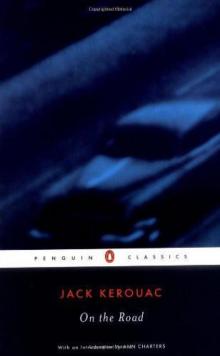 On the Road
On the Road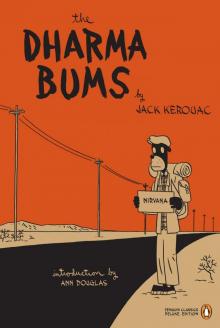 The Dharma Bums
The Dharma Bums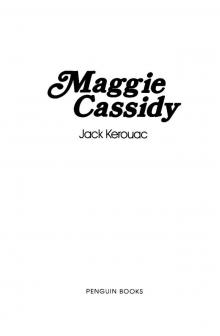 Maggie Cassidy
Maggie Cassidy Big Sur
Big Sur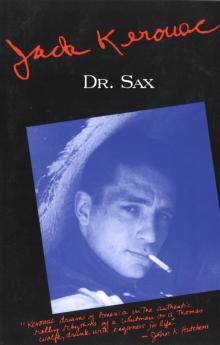 Dr. Sax
Dr. Sax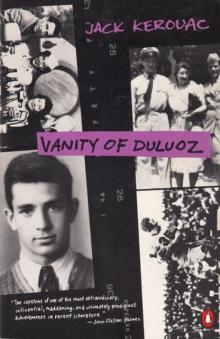 Vanity of Duluoz: An Adventurous Education, 1935-46
Vanity of Duluoz: An Adventurous Education, 1935-46 The Sea Is My Brother
The Sea Is My Brother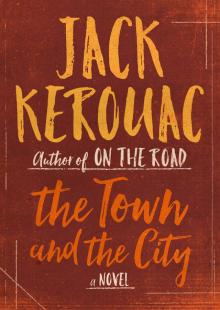 The Town and the City: A Novel
The Town and the City: A Novel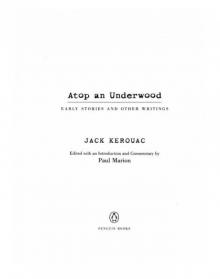 Atop an Underwood: Early Stories and Other Writings
Atop an Underwood: Early Stories and Other Writings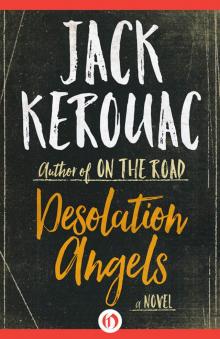 Desolation Angels: A Novel
Desolation Angels: A Novel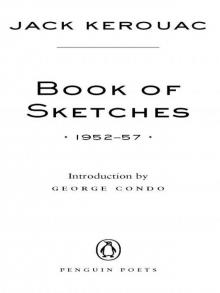 Book of Sketches
Book of Sketches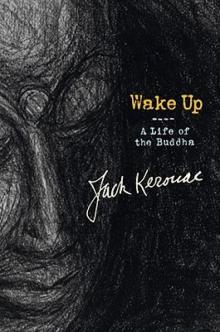 Wake Up: A Life of the Buddha
Wake Up: A Life of the Buddha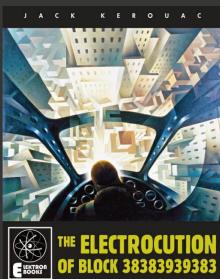 The Electrocution of Block 38383939383
The Electrocution of Block 38383939383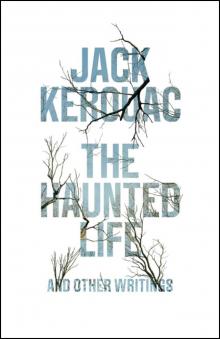 Haunted Life
Haunted Life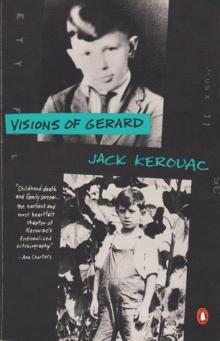 Visions of Gerard
Visions of Gerard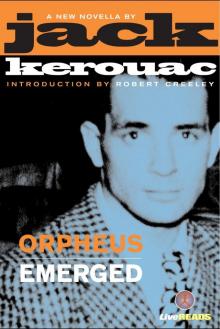 Orpheus Emerged
Orpheus Emerged Book of Blues
Book of Blues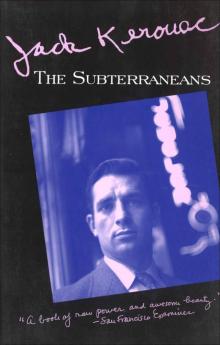 The Subterraneans
The Subterraneans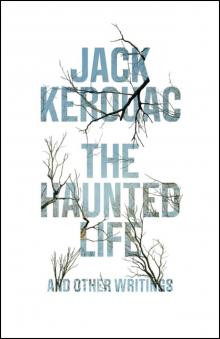 The Haunted Life
The Haunted Life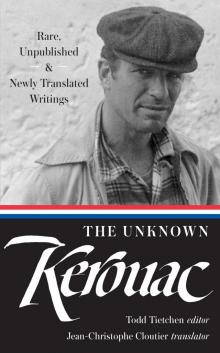 The Unknown Kerouac
The Unknown Kerouac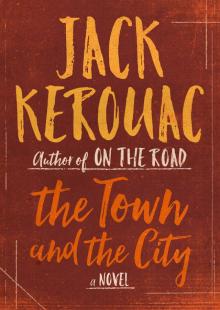 The Town and the City
The Town and the City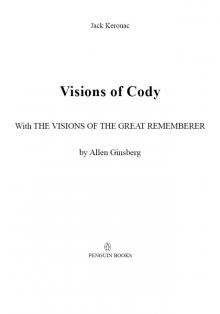 Visions of Cody
Visions of Cody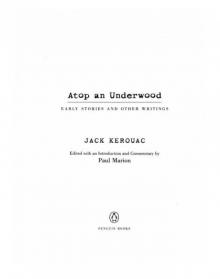 Atop an Underwood
Atop an Underwood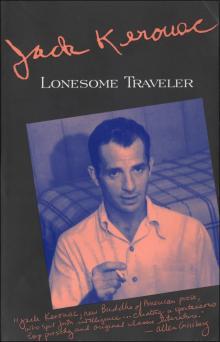 Lonesome Traveler
Lonesome Traveler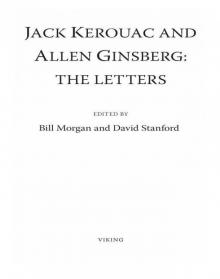 Jack Kerouac and Allen Ginsberg
Jack Kerouac and Allen Ginsberg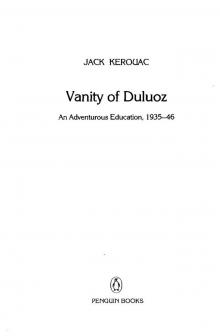 Vanity of Duluoz
Vanity of Duluoz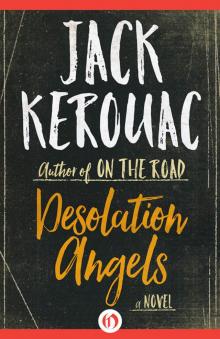 Desolation Angels
Desolation Angels On the Road: The Original Scroll: (Penguin Classics Deluxe Edition)
On the Road: The Original Scroll: (Penguin Classics Deluxe Edition) The Sea Is My Brother: The Lost Novel
The Sea Is My Brother: The Lost Novel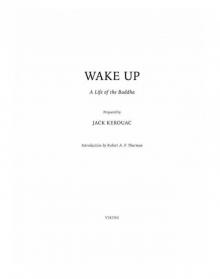 Wake Up
Wake Up The Poetry of Jack Kerouac
The Poetry of Jack Kerouac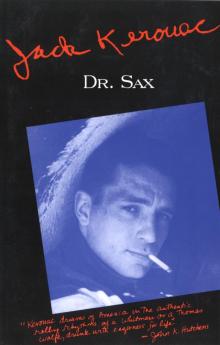 Doctor Sax
Doctor Sax